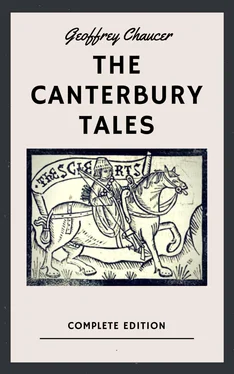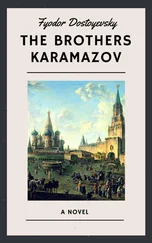As for the time, it may no better betide.
On her he got a knave* child anon, *male <14>
And to a Bishop and to his Constable eke
He took his wife to keep, when he is gone
To Scotland-ward, his foemen for to seek.
Now fair Constance, that is so humble and meek,
So long is gone with childe till that still
She held her chamb'r, abiding Christe's will
The time is come, a knave child she bare;
Mauricius at the font-stone they him call.
This Constable *doth forth come* a messenger, *caused to come forth*
And wrote unto his king that clep'd was All',
How that this blissful tiding is befall,
And other tidings speedful for to say
He* hath the letter, and forth he go'th his way. *i.e. the messenger
This messenger, to *do his avantage,* *promote his own interest*
Unto the kinge's mother rideth swithe,* *swiftly
And saluteth her full fair in his language.
"Madame," quoth he, "ye may be glad and blithe,
And thanke God an hundred thousand sithe;* *times
My lady queen hath child, withoute doubt,
To joy and bliss of all this realm about.
"Lo, here the letter sealed of this thing,
That I must bear with all the haste I may:
If ye will aught unto your son the king,
I am your servant both by night and day."
Donegild answer'd, "As now at this time, nay;
But here I will all night thou take thy rest,
To-morrow will I say thee what me lest.*" *pleases
This messenger drank sadly* ale and wine, *steadily
And stolen were his letters privily
Out of his box, while he slept as a swine;
And counterfeited was full subtilly
Another letter, wrote full sinfully,
Unto the king, direct of this mattere
From his Constable, as ye shall after hear.
This letter said, the queen deliver'd was
Of so horrible a fiendlike creature,
That in the castle none so hardy* was *brave
That any while he durst therein endure:
The mother was an elf by aventure
Become, by charmes or by sorcery,
And every man hated her company.
Woe was this king when he this letter had seen,
But to no wight he told his sorrows sore,
But with his owen hand he wrote again,
"Welcome the sond* of Christ for evermore *will, sending
To me, that am now learned in this lore:
Lord, welcome be thy lust* and thy pleasance, *will, pleasure
My lust I put all in thine ordinance.
"Keepe* this child, albeit foul or fair, *preserve
And eke my wife, unto mine homecoming:
Christ when him list may send to me an heir
More agreeable than this to my liking."
This letter he sealed, privily weeping.
Which to the messenger was taken soon,
And forth he went, there is no more to do'n.* *do
O messenger full fill'd of drunkenness,
Strong is thy breath, thy limbes falter aye,
And thou betrayest alle secretness;
Thy mind is lorn,* thou janglest as a jay; *lost
Thy face is turned in a new array;* *aspect
Where drunkenness reigneth in any rout,* *company
There is no counsel hid, withoute doubt.
O Donegild, I have no English dign* *worthy
Unto thy malice, and thy tyranny:
And therefore to the fiend I thee resign,
Let him indite of all thy treachery
'Fy, mannish,* fy! O nay, by God I lie; *unwomanly woman
Fy, fiendlike spirit! for I dare well tell,
Though thou here walk, thy spirit is in hell.
This messenger came from the king again,
And at the kinge's mother's court he light,* *alighted
And she was of this messenger full fain,* *glad
And pleased him in all that e'er she might.
He drank, and *well his girdle underpight*; *stowed away (liquor)
He slept, and eke he snored in his guise under his girdle*
All night, until the sun began to rise.
Eft* were his letters stolen every one, *again
And counterfeited letters in this wise:
The king commanded his Constable anon,
On pain of hanging and of high jewise,* *judgement
That he should suffer in no manner wise
Constance within his regne* for to abide *kingdom
Three dayes, and a quarter of a tide;
But in the same ship as he her fand,
Her and her younge son, and all her gear,
He shoulde put, and crowd* her from the land, *push
And charge her, that she never eft come there.
O my Constance, well may thy ghost* have fear, *spirit
And sleeping in thy dream be in penance,* *pain, trouble
When Donegild cast* all this ordinance.** *contrived **plan, plot
This messenger, on morrow when he woke,
Unto the castle held the nexte* way, *nearest
And to the constable the letter took;
And when he this dispiteous* letter sey,** *cruel **saw
Full oft he said, "Alas, and well-away!
Lord Christ," quoth he, "how may this world endure?
So full of sin is many a creature.
"O mighty God, if that it be thy will,
Since thou art rightful judge, how may it be
That thou wilt suffer innocence to spill,* *be destroyed
And wicked folk reign in prosperity?
Ah! good Constance, alas! so woe is me,
That I must be thy tormentor, or dey* *die
A shameful death, there is no other way.
Wept bothe young and old in all that place,
When that the king this cursed letter sent;
And Constance, with a deadly pale face,
The fourthe day toward her ship she went.
But natheless she took in good intent
The will of Christ, and kneeling on the strond* *strand, shore
She saide, "Lord, aye welcome be thy sond* *whatever thou sendest
"He that me kepte from the false blame,
While I was in the land amonges you,
He can me keep from harm and eke from shame
In the salt sea, although I see not how
As strong as ever he was, he is yet now,
In him trust I, and in his mother dere,
That is to me my sail and eke my stere."* *rudder, guide
Her little child lay weeping in her arm
And, kneeling, piteously to him she said
"Peace, little son, I will do thee no harm:"
With that her kerchief off her head she braid,* *took, drew
And over his little eyen she it laid,
And in her arm she lulled it full fast,
And unto heav'n her eyen up she cast.
"Mother," quoth she, "and maiden bright, Mary,
Sooth is, that through a woman's eggement* *incitement, egging on
Mankind was lorn,* and damned aye to die; *lost
For which thy child was on a cross y-rent:* *torn, pierced
Thy blissful eyen saw all his torment,
Then is there no comparison between
Thy woe, and any woe man may sustene.
"Thou saw'st thy child y-slain before thine eyen,
And yet now lives my little child, parfay:* *by my faith
Now, lady bright, to whom the woeful cryen,
Thou glory of womanhood, thou faire may,* *maid
Thou haven of refuge, bright star of day,
Rue* on my child, that of thy gentleness *take pity
Ruest on every rueful* in distress. *sorrowful person
"O little child, alas! what is thy guilt,
That never wroughtest sin as yet, pardie?* *par Dieu; by God
Why will thine harde* father have thee spilt?** *cruel **destroyed
O mercy, deare Constable," quoth she,
"And let my little child here dwell with thee:
And if thou dar'st not save him from blame,
So kiss him ones in his father's name."
Therewith she looked backward to the land,
And saide, "Farewell, husband rutheless!"
And up she rose, and walked down the strand
Toward the ship, her following all the press:* *multitude
And ever she pray'd her child to hold his peace,
And took her leave, and with an holy intent
She blessed her, and to the ship she went.
Victualed was the ship, it is no drede,* *doubt
Читать дальше












